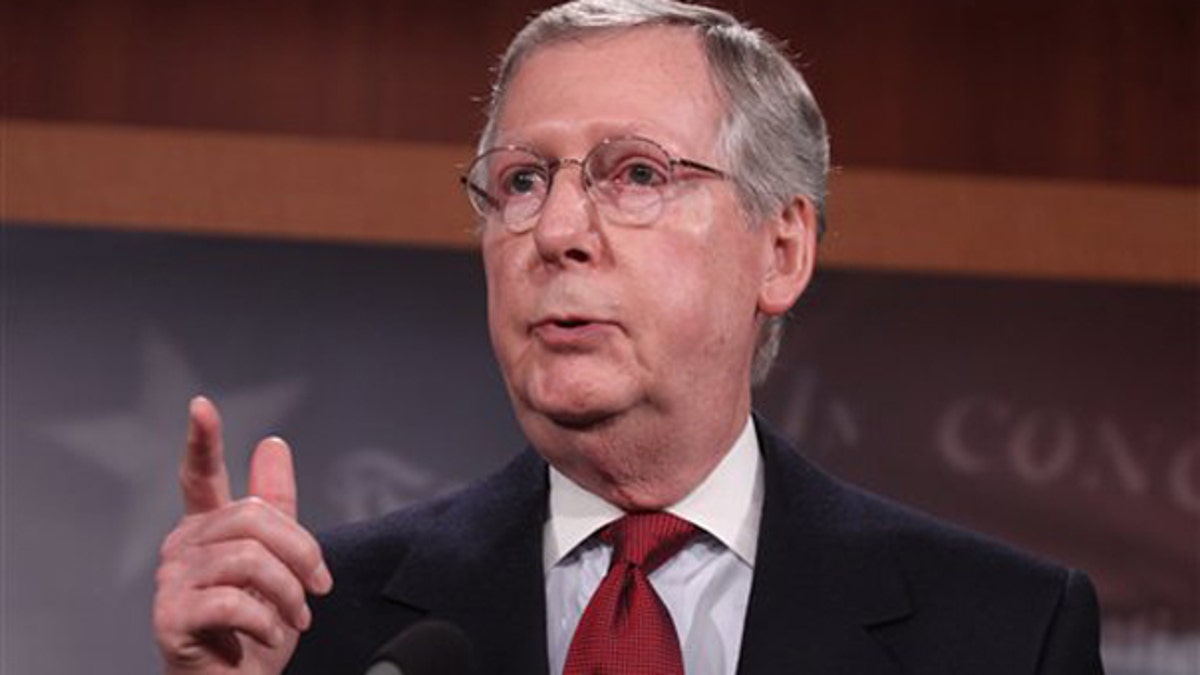
FILE: Jan. 12, 2010: Senate Minority Leader Mitch McConnell gestures while meeting with reporters on Capitol Hill, in Washington, D.C. (AP)
Republicans are going to show up Thursday for a meeting on health care reform with President Obama and congressional Democrats, but they aren't going to accept whole cloth a bill outlining Democratic plans that is being posted on the White House Web site Monday.
"If they are going to lay out the plan they want four days in advance, what are we discussing?" Senate Minority Leader Mitch McConnell, R-Ky., asked on "Fox News Sunday."
McConnell repeatedly used the word "arrogant" to describe any plan to move forward with health care proposals that the American people widely panned last year. He added that reconciliation -- a budget maneuver that allows the majority party to pass legislation with 51 votes and no procedural blocks -- would not fly.
"You know, we've witnessed the 'Cornhusker kickback,' the 'Louisiana purchase,' 'the Gatorade,' the special deal for Florida. Now they are suggesting they might use a device which has never been used the for this kind of major systemic reform. We know it would be -- the only thing bipartisan about it would be the opposition to it," he said.
"I think they're having a hard time getting the message here. The American people do not want this bill to pass. And it strikes me as rather arrogant to say, 'Well, we're going to give it to you anyway, and we'll use whatever device is available to achieve that end,'" McConnell added.
In his weekly radio and Internet address on Saturday, President Obama said doing nothing is not an option but the only way to get something done is for Democrats and Republicans to cooperate.
"I am inviting members of both parties to take part in a bipartisan health care meeting, and I hope they come in a spirit of good faith. I don't want to see this meeting turn into political theater, with each side simply reciting talking points and trying to score political points," he said.
The Blair House meeting takes place nearly a year after Obama launched his drive to remake health care -- a Democratic agenda item for decades -- at an earlier summit he infused with a bipartisan spirit. The president will point out that Republicans have supported individual elements of the Democratic bills.
But his latest plan has little chance of getting GOP support. Built on the Senate bill, it would require most Americans to carry coverage, with federal subsidies to help many afford the premiums. It would bar insurance companies from denying coverage to people with medical problems or charging them more. Regulators would create a competitive marketplace for small businesses and people buying their own coverage. The plan would be paid for with a mix of Medicare cuts and tax increases.
It was expected that the White House proposal would scale back the Senate bill's tax on high-cost insurance plans. It would also strip out special Medicaid deals for certain states, while moving to close the Medicare prescription coverage gap, and making newly available coverage for working families more affordable. The changes would cost about $200 billion over 10 years. It's unclear what the total price tag for the legislation would be; the Senate bill was originally under $900 billion.
Mississippi Gov. Haley Barbour said the president and Congress could follow President Clinton's lead on welfare reform and adopt models that have proven effective in the states.
"I think that health care reform is likely to turn out like welfare reform. After a handful of governors did it right in the '90s, it finally pushed it over the edge" and Washington got on board.
Another piece of advice from Barbour to Washington: "We cut our budgets. You can actually cut government spending, and they can learn that from us too."
The Associated Press contributed to this report.












































